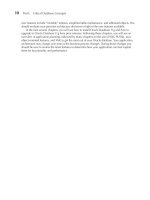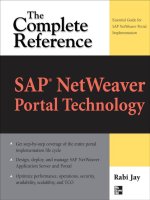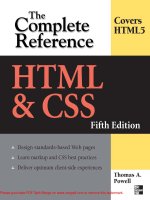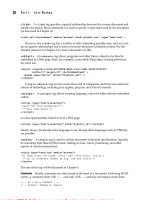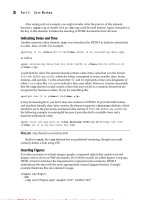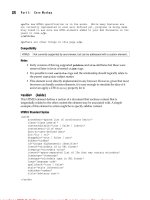McGraw hill c the complete reference, 4th ed
Bạn đang xem bản rút gọn của tài liệu. Xem và tải ngay bản đầy đủ của tài liệu tại đây (5.53 MB, 867 trang )
TEAMFLY
Team-Fly
®
Page i
C
The Complete Reference
Fourth Edition
Page ii
ABOUT THE AUTHOR
Herbert Schildt is the world's leading programming author. He is an authority on the C and C++
languages, a master Windows programmer, and an expert on Java. His programming books have
sold more that 2.5 million copies worldwide and have been translated into all major foreign
languages. He is the author of numerous bestsellers, including C++: The Complete Reference,
Teach Yourself C, Teach Yourself C++, C++ from the Ground Up, Windows 2000 Programming
from the Ground Up
, and Java: The Complete Reference. Schildt holds a master's degree in
computer science from the University of Illinois. He can be reached at his consulting office at (217)
586
-
4683.
Page iii
C
The Complete Reference
Fourth Edition
Herbert Schildt
Page iv
Copyright © 2000 by The McGraw-
Hill Companies. All rights reserved. Manufactured in the United
States of America. Except as permitted under the United States Copyright Act of 1976, no part of
this publication may be reproduced or distributed in any form or by any means, or stored in a
database or retrieval system, without the prior written permission of the publisher.
0
-
07
-
213295
-
7
The material in this eBook also appears in the print version of this title: 0
-
07
-
212124
-
6.
All trademarks are trademarks of their respective owners. Rather than put a trademark symbol after
every occurrence of a trademarked name, we use names in an editorial fashion only, and to the
benefit of the trademark owner, with no intention of infringement of the trademark. Where such
designations appear in this book, they have been printed with initial caps.
McGraw-Hill eBooks are available at special quantity discounts to use as premiums and sales
promotions, or for use in corporate training programs. For more information, please contact George
Hoare, Special Sales, at george_hoare@mcgraw
-
hill.com or (212) 904
-
4069.
TERMS OF USE
This is a copyrighted work and The McGraw-Hill Companies, Inc. (''McGraw-Hill") and its
licensors reserve all rights in and to the work. Use of this work is subject to these terms. Except as
permitted under the Copyright Act of 1976 and the right to store and retrieve one copy of the work,
you may not decompile, disassemble, reverse engineer, reproduce, modify, create derivative works
based upon, transmit, distribute, disseminate, sell, publish or sublicense the work or any part of it
without McGraw-Hill's prior consent. You may use the work for your own noncommercial and
personal use; any other use of the work is strictly prohibited. Your right to use the work may be
terminated if you fail to comply with these terms.
THE WORK IS PROVIDED "AS IS". McGRAW-HILL AND ITS LICENSORS MAKE NO
GUARANTEES OR WARRANTIES AS TO THE ACCURACY, ADEQUACY OR
COMPLETENESS OF OR RESULTS TO BE OBTAINED FROM USING THE WORK,
INCLUDING ANY INFORMATION THAT CAN BE ACCESSED THROUGH THE WORK VIA
HYPERLINK OR OTHERWISE, AND EXPRESSLY DISCLAIM ANY WARRANTY, EXPRESS
OR IMPLIED, INCLUDING BUT NOT LIMITED TO IMPLIED WARRANTIES OF
MERCHANTABILITY OR FITNESS FOR A PARTICULAR PURPOSE. McGraw-Hill and its
licensors do not warrant or guarantee that the functions contained in the work will meet your
requirements or that its operation will be uninterrupted or error free. Neither McGraw-Hill nor its
licensors shall be liable to you or anyone else for any inaccuracy, error or omission, regardless of
cause, in the work or for any damages resulting therefrom. McGraw-Hill has no responsibility for
the content of any information accessed through the work. Under no circumstances shall McGraw-
Hill and/or its licensors be liable for any indirect, incidental, special, punitive, consequential or
similar damages that result from the use of or inability to use the work, even if any of them has been
advised of the possibility of such damages. This limitation of liability shall apply to any claim or
cause whatsoever whether such claim or cause arises in contract, tort or otherwise.
DOI: 10.1036/0
-
07
-
213295
-
7
Page v
CONTENTS
Preface
xxiii
Part I
Foundational C
1
An Overview of C
3
A Brief History of C
4
C Is a Middle
-
Level Language
5
C Is a Structured Language
6
C Is a Programmer's Language
8
Compilers Vs. Interpreters
9
The Form of a C Program
10
The Library and Linking
11
Separate Compilation
12
Compiling a C Program
13
C's Memory Map
13
C Vs. C++
14
Review of Terms
15
Page vi
2
Expressions
17
The Basic Data Types
18
Modifying the Basic Types
18
Identifier Names
20
Variables
21
Where Variables Are Declared
21
Local Variables
22
Formal Parameters
25
Global Variables
26
The Four C Scopes
27
Type Qualifiers
28
const
28
volatile
30
Storage Class Specifiers
30
extern
31
static Variables
33
register Variables
35
Variable Initializations
36
Constants
37
Hexadecimal and Octal Constants
38
String Constants
38
Backslash Character Constants
39
Operators
40
The Assignment Operator
40
Arithmetic Operators
43
The Increment and Decrement Operators
44
Relational and Logical Operators
46
Bitwise Operators
48
The ? Operator
53
The & and * Pointer Operators
53
The Compile
-
Time Operator sizeof
55
The Comma Operator
56
The Dot (.) and Arrow (
–
>)
Operators
56
The [ ] and ( ) Operators
57
Precedence Summary
58
Expressions
58
Order of Evaluation
58
Type Conversion in Expressions
59
Casts
60
Spacing and Parentheses
61
3
Statements
63
True and False in C
64
Page vii
Selection Statements
64
if
64
Nested ifs
66
The if
-
else
-
if Ladder
67
The ? Alternative
69
The Conditional Expression
72
switch
72
Nested switch Statements
75
Iteration Statements
76
The for Loop
76
for Loop Variations
77
The Infinite Loop
82
for Loops with No Bodies
82
Declaring Variables within a for Loop
83
The while Loop
83
The do
-
while Loop
86
Jump Statements
87
The return Statement
87
The goto Statement
88
The break Statement
89
The exit( ) Function
90
The continue Statement
91
Expression Statements
93
Block Statements
93
4
Arrays and Strings
95
Single
-
Dimension Arrays
96
Generating a Pointer to an Array
97
Passing Single
-
Dimension Arrays to Functions
98
Strings
99
Two
-
Dimensional Arrays
101
Arrays of Strings
106
Multidimensional Arrays
107
Indexing Pointers
108
Array Initialization
110
Unsized Array Initializations
112
Variable
-
Length Arrays
113
A Tic
-
Tac
-
Toe Example
114
5
Pointers
119
What Are Pointers?
120
Pointer Variables
121
The Pointer Operators
121
Page viii
Pointer Expressions
122
Pointer Assignments
122
Pointer Conversions
123
Pointer Arithmetic
124
Pointer Comparisons
126
Pointers and Arrays
128
Arrays of Pointers
129
Multiple Indirection
130
Initializing Pointers
131
Pointers to Functions
134
C's Dynamic Allocation Functions
138
Dynamically Allocated Arrays
140
restrict
-
Qualified Pointers
142
Problems with Pointers
143
6
Functions
147
The General Form of a Function
148
Understanding the Scope of a Function
148
Function Arguments
149
Call by Value, Call by Reference
149
Creating a Call by Reference
150
Calling Functions with Arrays
152
argc and argv
—
Arguments to main( )
155
TEAMFLY
Team-Fly
®
The return Statement
158
Returning from a Function
158
Returning Values
160
Returning Pointers
162
Functions of Type void
163
What Does main( ) Return?
164
Recursion
164
Function Prototypes
166
Old
-
Style Function Declarations
168
Standard Library Function Prototypes
169
Declaring Variable Length Parameter Lists
169
The ''Implicit int" Rule
170
Old
-
Style Vs. Modern Function Parameter Declarations
171
The inline Keyword
172
7
Structures, Unions, Enumerations, and typedef
173
Structures
174
Accessing Structure Members
176
Structure Assignments
177
Page ix
Arrays of Structures
178
A Mailing List Example
178
Passing Structures to Functions
186
Passing Structure Members to Functions
186
Passing Entire Structures to Functions
187
Structure Pointers
188
Declaring a Structure Pointer
189
Using Structure Pointers
189
Arrays and Structures within Structures
192
Unions
193
Bit
-
Fields
195
Enumerations
198
An Important Difference between C and C++
200
Using sizeof to Ensure Portability
201
typedef
203
8
Console I/O
205
Reading and Writing Characters
206
A Problem with getchar( )
207
Alternatives to getchar( )
208
Reading and Writing Strings
209
Formatted Console I/O
212
printf( )
212
Printing Characters
213
Printing Numbers
214
Displaying an Address
215
The %n Specifier
216
Format Modifiers
216
The Minimum Field Width Specifier
216
The Precision Specifier
218
Justifying Output
219
Handling Other Data Types
219
The * and # Modifiers
220
scanf( )
221
Format Specifiers
221
Inputting Numbers
221
Inputting Unsigned Integers
223
Reading Individual Characters Using scanf
( )
223
Reading Strings
223
Inputting an Address
224
The %n Specifier
224
Using a Scanset
224
Discarding Unwanted White Space
225
Page x
Non
-
White
-
Space Characters in the Control String
226
You Must Pass scanf( ) Addresses
226
Format Modifiers
226
Suppressing Input
227
9
File I/O
229
C vs. C++ File I/O
230
Standard C Vs. Unix File I/O
230
Streams and Files
230
Streams
231
Files
231
File System Basics
232
The File Pointer
232
Opening a File
232
Closing a File
235
Writing a Character
235
Reading a Character
236
Using fopen( ), getc( ), putc( ), and fclose( )
236
Using feof( )
238
Working with Strings: fputs( ) and fgets( )
239
rewind( )
240
ferror( )
241
Erasing Files
243
Flushing a Stream
244
fread( ) and fwrite( )
245
Using fread( ) and fwrite( )
245
fseek( ) and Random
-
Access
253
fprintf( ) and fscanf( )
254
The Standard Streams
256
The Console I/O Connection
257
Using freopen( ) to Redirect the Standard Streams
258
10
The Preprocessor and Comments
261
The Preprocessor
262
#define
262
Defining Function
-
like Macros
264
#error
265
#include
265
Conditional Compilation Directives
266
#if, #else, #elif, and #endif
266
#ifdef and #ifndef
269
#undef
270
Using defined
270
#line
271
Page xi
#pragma
272
The # and ## Preprocessor Operators
272
Predefined Macro Names
273
Comments
274
Single
-
Line Comments
275
Part II
The C99 Standard
11
C99
279
C89 Vs. C99: An Overview
280
Features Added
280
Features Removed
281
Features Changed
281
restrict
-
Qualified Pointers
282
inline
282
New Built
-
in Data Types
284
_Bool
284
_Complex and _Imaginary
284
The long long Integer Types
285
Array Enhancements
285
Variable
-
Length Arrays
285
Use of Type Qualifiers in an Array Declaration
286
Single
-
Line Comments
286
Interspersed Code and Declarations
286
Preprocessor Changes
287
Variable Argument Lists
287
The _Pragma Operator
288
Built
-
in Pragmas
288
Additional Built
-
in Macros
289
Declaring Variables within a for Loop
289
Compound Literals
290
Flexible Array Structure Members
291
Designated Initializers
291
Additions to the printf( ) and scanf( ) Family of Functions
292
New Libraries in C99
293
The _ _func_ _ Predefined Identifier
293
Increased Translation Limits
294
Implicit int No Longer Supported
294
Implicit Function Declarations Have Been Removed
296
Restrictions on return
296
Extended Integer Types
297
Changes to the Integer Promotion Rules
297
Page xii
Part III
The C Standard Library
12
Linking, Libraries, and Headers
301
The Linker
302
Separate Compilation
302
Relocatable Vs. Absolute Code
303
Linking with Overlays
303
Linking with DLLs
304
The C Standard Library
305
Library Files Vs. Object Files
305
Headers
305
Macros in Headers
307
Redefinition of Library Functions
308
13
I/O Functions
309
clearerr
310
fclose
312
feof
313
ferror
313
fflush
314
fgetc
315
fgetpos
316
fgets
317
fopen
318
fprintf
320
fputc
321
fputs
321
fread
322
freopen
323
fscanf
324
fseek
325
fsetpos
326
ftell
327
fwrite
328
getc
329
getchar
330
gets
331
perror
332
printf
332
Format Modifiers for printf( ) Added by C99
335
putc
336
putchar
337
puts
337
Page xiii
remove
338
rename
339
rewind
340
scanf
340
Format Modifiers for scanf( ) Added by C99
344
setbuf
345
setvbuf
345
snprintf
346
sprintf
347
sscanf
347
tmpfile
348
tmpnam
349
ungetc
350
vprintf, vfprintf, vsprintf, and vsnprintf
351
vscanf, vfscanf, and vsscanf
352
14
String and Character Functions
353
isalnum
354
isalpha
355
isblank
356
iscntrl
357
isdigit
358
isgraph
358
TEAMFLY
Team-Fly
®
islower
359
isprint
360
ispunct
361
isspace
362
isupper
362
isxdigit
363
memchr
364
memcmp
365
memcpy
366
memmove
367
memset
368
strcat
368
strchr
369
strcmp
370
strcoll
371
strcpy
372
strcspn
372
strerror
373
strlen
373
strncat
374
strncmp
375
strncpy
376
Page xiv
strpbrk
377
strrchr
377
strspn
378
strstr
379
strtok
380
strxfrm
381
tolower
381
toupper
382
15
Mathematical Functions
383
acos
386
acosh
387
asin
387
asinh
388
atan
388
atanh
389
atan2
390
cbrt
391
ceil
391
copysign
392
cos
392
cosh
393
erf
394
erfc
394
exp
395
exp2
395
expm1
395
fabs
396
fdim
397
floor
397
fma
398
fmax
398
fmin
398
fmod
399
frexp
399
hypot
400
ilogb
400
ldexp
401
lgamma
402
llrint
402
llround
402
log
403
log1p
404
Page xv
log10
404
log2
405
logb
405
lrint
406
lround
406
modf
406
nan
407
nearbyint
407
nextafter
408
nexttoward
408
pow
409
remainder
409
remquo
410
rint
410
round
411
scalbln
411
scalbn
412
sin
412
sinh
413
sqrt
414
tan
414
tanh
415
tgamma
416


